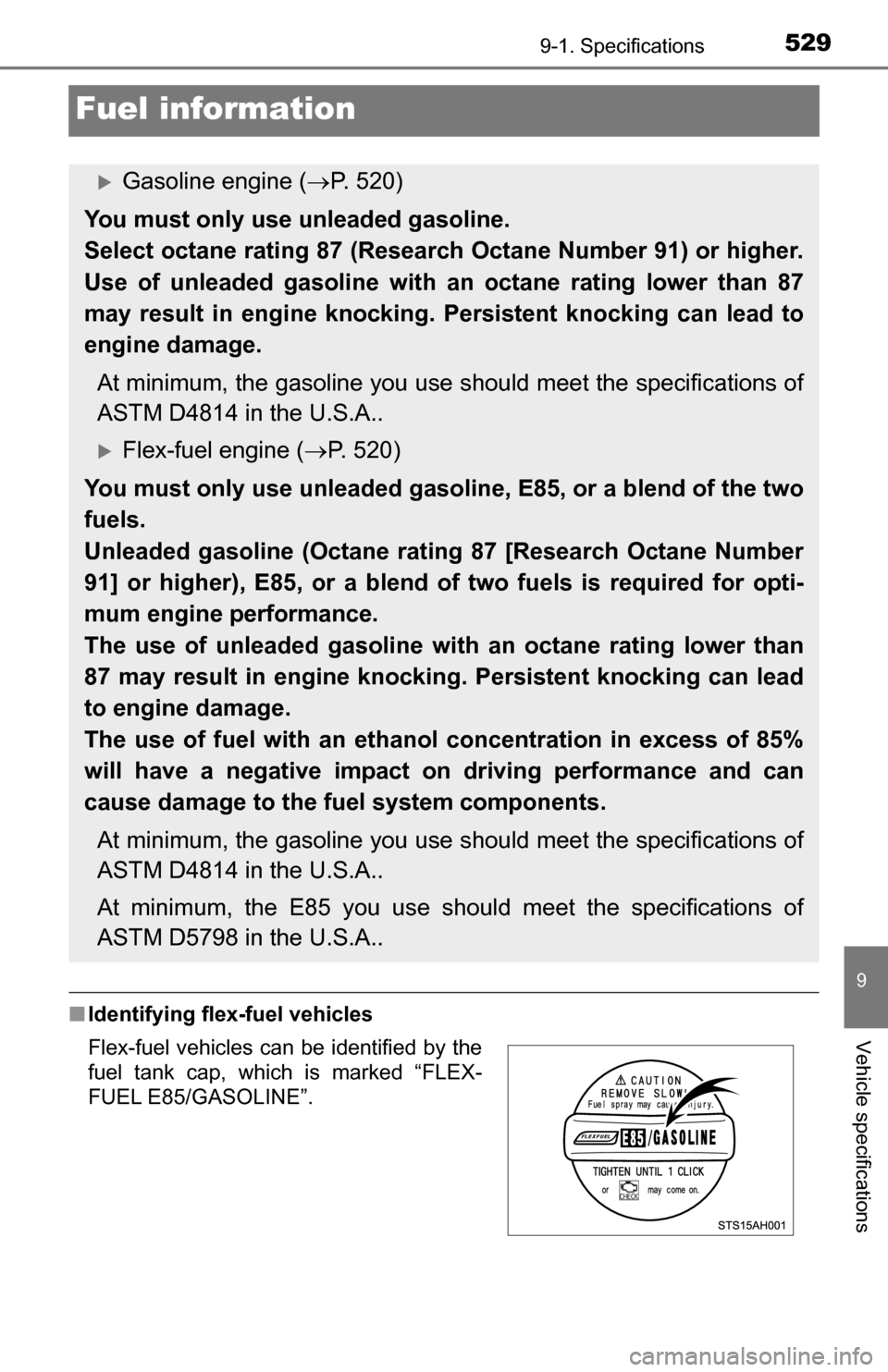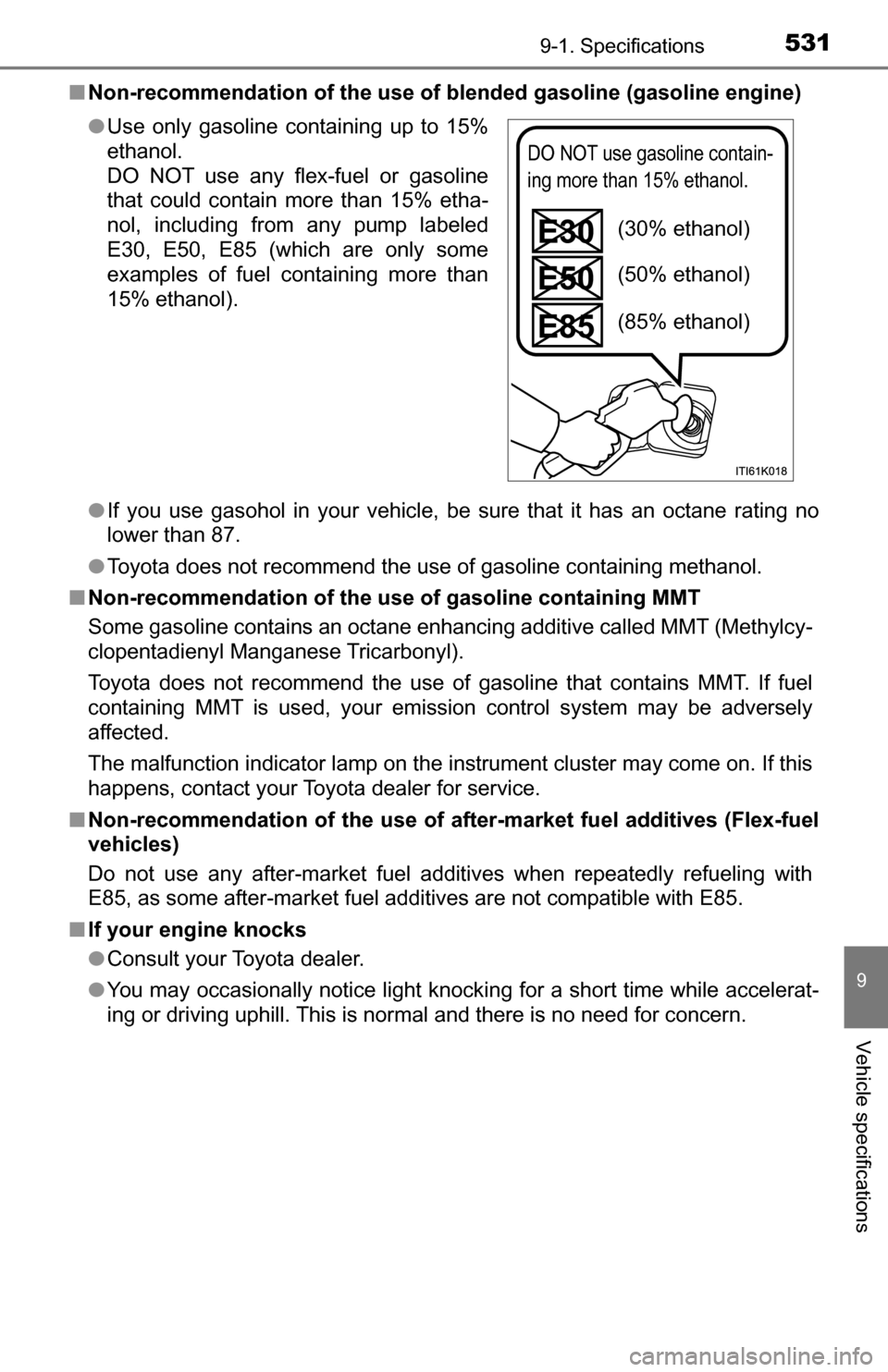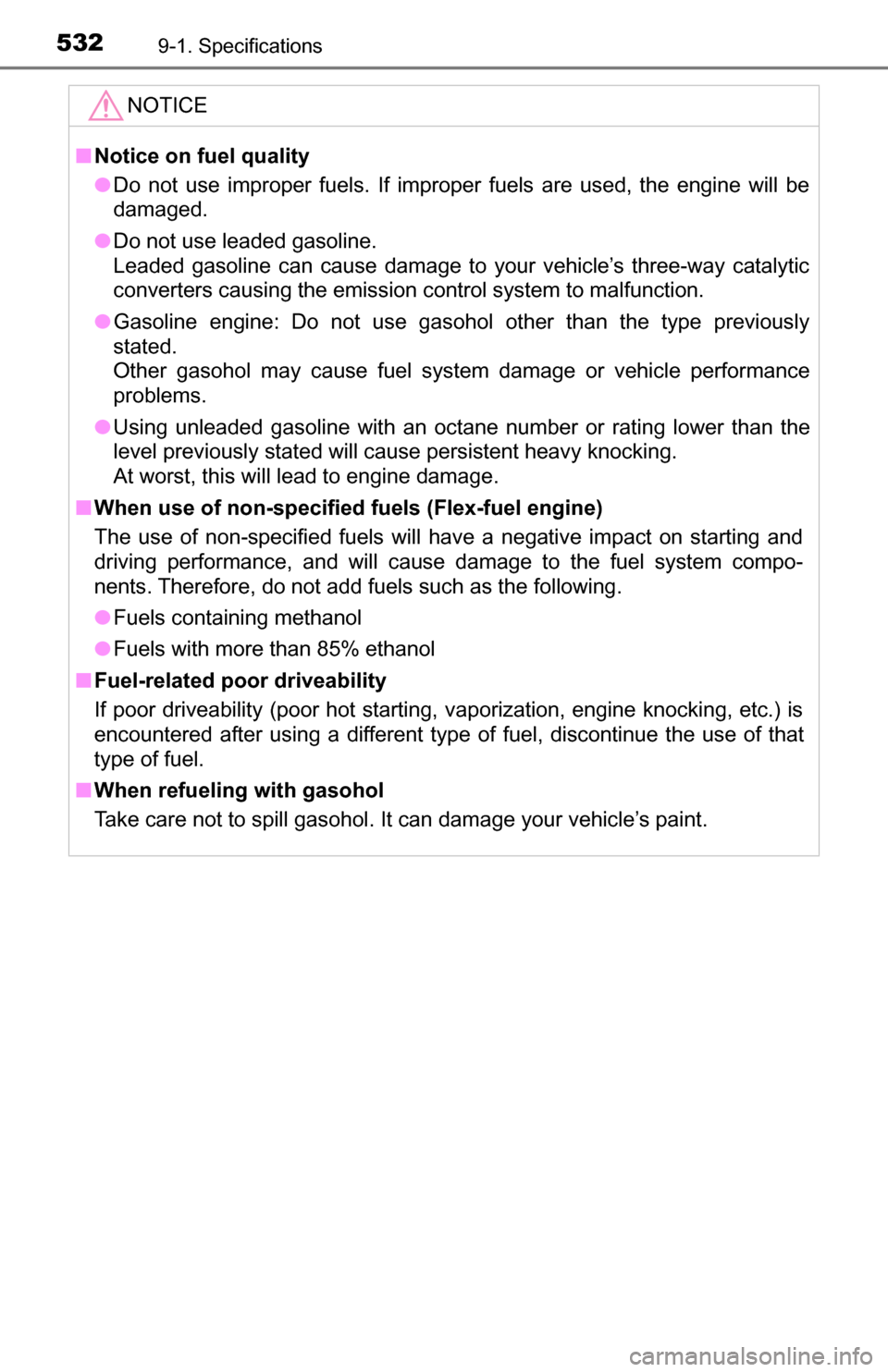Page 520 of 588
5209-1. Specifications
Engine
Model1UR-FE, 3UR-FE, 3UR-FBE
Ty p e8-cylinder V-type, 4-cycle, gasoline
Bore and stroke
1UR-FE engine
3.70 3.27 in. (94.0 83.0 mm)
3UR-FE and 3UR-FBE engines
3.70 4.02 in. (94.0 102.0 mm)
Displacement
1UR-FE engine
281.2 cu.in. (4608 cm
3)
3UR-FE and 3UR-FBE engines
345.6 cu.in. (5663 cm
3)
Drive belt tensionAutomatic adjustment
Valve clearance
(engine cold)Automatic adjustment
Fuel
EngineModel1UR-FE and 3UR-FE
engines3UR-FBE engine
Ty p eGasoline engineFlex-fuel engine
Fuel typeUnleaded gasoline only
Unleaded gasoline,
E85, or a blend of the two fuels
Octane rating
(Unleaded gasoline)87 (Research Octane Number 91) or higher
Ethanol percentage
(E85)—85% or less
Fuel tank capacity
(Reference)
Standard fuel tank: 26.4 gal. (100.0 L, 22.0 Imp.gal.)
Large fuel tank: 38.0 gal. (144.0 L, 31.7 Imp.gal.)
Page 529 of 588

5299-1. Specifications
9
Vehicle specifications
Fuel information
■Identifying flex-fuel vehicles
Gasoline engine ( P. 520)
You must only use unleaded gasoline.
Select octane rating 87 (Research Octane Number 91) or higher.
Use of unleaded gasoline with an octane rating lower than 87
may result in engine knocking. Persistent knocking can lead to
engine damage.
At minimum, the gasoline you use s hould meet the specifications of
ASTM D4814 in the U.S.A..
Flex-fuel engine ( P. 520)
You must only use unleaded gasoline, E85, or a blend of the two
fuels.
Unleaded gasoline (Octane rating 87 [Research Octane Number
91] or higher), E85, or a blend of two fuels is required for opti-
mum engine performance.
The use of unleaded gasoline with an octane rating lower than
87 may result in engine knocki ng. Persistent knocking can lead
to engine damage.
The use of fuel with an ethanol concentration in excess of 85%
will have a negative impact on driving performance and can
cause damage to the fuel system components.
At minimum, the gasoline you use s hould meet the specifications of
ASTM D4814 in the U.S.A..
At minimum, the E85 you use s hould meet the specifications of
ASTM D5798 in the U.S.A..
Flex-fuel vehicles can be identified by the
fuel tank cap, which is marked “FLEX-
FUEL E85/GASOLINE”.
Page 531 of 588

5319-1. Specifications
9
Vehicle specifications
■Non-recommendation of the use of blended gasoline (gasoline engine)
●If you use gasohol in your vehicle, be sure that it has an octane rating no
lower than 87.
● Toyota does not recommend the use of gasoline containing methanol.
■ Non-recommendation of the use of gasoline containing MMT
Some gasoline contains an octane enhancing additive called MMT (Methylcy-
clopentadienyl Manganese Tricarbonyl).
Toyota does not recommend the use of gasoline that contains MMT. If fuel
containing MMT is used, your emission control system may be adversely
affected.
The malfunction indicator lamp on the instrument cluster may come on. If this
happens, contact your Toyota dealer for service.
■ Non-recommendation of the use of after-market fuel additives (Flex-fuel
vehicles)
Do not use any after-market fuel additives when repeatedly refueling with
E85, as some after-market fuel additives are not compatible with E85.
■ If your engine knocks
●Consult your Toyota dealer.
● You may occasionally notice light knocking for a short time while accelerat-
ing or driving uphill. This is normal and there is no need for concern.
●
Use only gasoline containing up to 15%
ethanol.
DO NOT use any flex-fuel or gasoline
that could contain more than 15% etha-
nol, including from any pump labeled
E30, E50, E85 (which are only some
examples of fuel containing more than
15% ethanol).
DO NOT use gasoline contain-
ing more than 15% ethanol.
(30% ethanol)
(50% ethanol)
(85% ethanol)
Page 532 of 588

5329-1. Specifications
NOTICE
■Notice on fuel quality
● Do not use improper fuels. If improper fuels are used, the engine will be
damaged.
● Do not use leaded gasoline.
Leaded gasoline can cause damage to your vehicle’s three-way catalytic
converters causing the emission control system to malfunction.
● Gasoline engine: Do not use gasohol other than the type previously
stated.
Other gasohol may cause fuel system damage or vehicle performance
problems.
● Using unleaded gasoline with an octane number or rating lower than the
level previously stated will cause persistent heavy knocking.
At worst, this will lead to engine damage.
■ When use of non-specified fuels (Flex-fuel engine)
The use of non-specified fuels will have a negative impact on starting and
driving performance, and will cause damage to the fuel system compo-
nents. Therefore, do not add fuels such as the following.
● Fuels containing methanol
● Fuels with more than 85% ethanol
■ Fuel-related poor driveability
If poor driveability (poor hot starting, vaporization, engine knocking, etc.) is
encountered after using a different type of fuel, discontinue the use of that
type of fuel.
■ When refueling with gasohol
Take care not to spill gasohol. It can damage your vehicle’s paint.